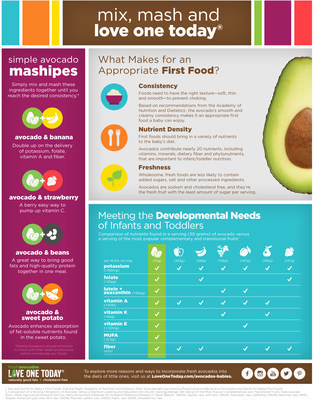MISSION VIEJO, California, Aug. 4, 2016 /PRNewswire-HISPANIC PR WIRE/ — New research published in the journal Nutrients on the best first foods for babies has high relevance for U.S. Hispanics which have a 35% higher birth rate than the general population.1 Introducing solid foods is a big milestone and like most parents, they are seeking guidance on making smart choices and avoiding mistakes. According to the scientific review paper, one common error is that caregivers often reach for first foods that tend to be too sweet and are not optimal as a beginner food for infants and toddlers. Fresh avocados was found to be an ideal first food.

The paper “The Role of Avocados in Complementary and Transitional Feeding” was funded by the Hass Avocado Board (HAB) and based on more than 100 studies of both emerging and conclusive research. Authors Kevin B. Comerford, PhD, RD, University of California at Davis, Keith T. Ayoob, EdD, RD, Albert Einstein College of Medicine, Robert D. Murray, MD, The Ohio State University, and Stephanie A. Atkinson, PhD, McMaster University, suggest that there are three qualities of foods to keep in mind when it is time to start solid foods as a complement to breastmilk and/or formula or time to transition to table foods. To ensure optimal health and acceptance, it is recommended to pick baby’s first foods based on:
- Nutrient Density: Infants need to consume moderately energy-dense foods that are low in sugar and rich in multiple nutrients that are key for proper infant health and development.
- Texture/Consistency: A variety of soft and smooth textures are best, such as creamy, lumpy, pureed or mashed to help develop the ability to chew and swallow.
- Neutral Flavor Profile: Ideal first foods should have a low to moderate sweet and salty flavor profile to avoid early preferences for sweet foods.
Education is key to informing families about how best to introduce first foods.
“It’s important that infants experience a wide variety of tastes, textures, colors and combinations,” says Dr. Robert Murray, fellow of the American Academy of Pediatrics. “Parents looking to identify appropriate first foods for their babies will find all of these key attributes in the avocado – a smooth, nutrient-dense and flavor-neutral first food that can be enjoyed across the lifespan.”
As the study suggests, avocados are unique among complementary and transitional foods in that they provide an ideal source of calories (mainly from “good” unsaturated fats) to meet the increasing energy and growth demands of weaning infants and growing toddlers, and help significantly enhance the absorption of fat-soluble vitamins from foods eaten with them. Additionally, avocados contain less than 1 gram of sugar per serving (0.09g)—the least amount of any other fresh fruit—and are higher in key developmental nutrients per one ounce serving, such as folate, vitamin E, and lutein, compared to a serving of the most popular complementary and transitional fruits served in many households. They also have the recommended physical characteristics that are ideal for babies to enjoy including a neutral flavor, smooth consistency and creamy texture.
A recent survey by HAB and the publishers of Parents Latina showed that more than half (64%) of moms were unaware of the important health benefits of avocados. After learning more about the good fats and other nutrients in avocados, 8 in 10 moms then reported to be more likely to feed their baby avocados.
“Choosing the best first foods for baby is a significant milestone so it is natural for moms to struggle with evaluating all the possible options,” said Sylvia Meléndez Klinger, R.D. and leading expert in cross-cultural Hispanic nutrition and health issues. “It is important to share the outcomes of research like this in Spanish so Hispanic moms and grandmas, often living under the same roof, receive the education and specific recommendations they are asking for. Different generations will approach first foods differently but with the same goal to give baby her best chance to achieve normal growth and development. Offering the most current scientific-based tips and easy recipes in Spanish helps ensure babies get off to a healthy start from their very first bites.”
HAB is committed to helping Spanish-speaking families better understand optimal foods and diets for infants and toddlers; for example, by inspiring new and delicious ways to pair avocados with other nutritious fruits and vegetables, like this two-ingredient Baby Food Avocado Chicken Puree.
To learn more about the goodness of avocados for babies, check out this new infographic as well as other tips and recipes at www.LoveOneToday.com/avocados-babies. To view the published white paper, visit http://www.mdpi.com/2072-6643/8/5/316/htm
- U.S. Census, National Vital Statistics Reports, January 15, 2015
About the Hass Avocado Board
The Hass Avocado Board (HAB) is an agriculture promotion group established in 2002 to promote the consumption of Hass Avocados in the United States. A 12-member board representing domestic producers and importers of Hass Avocados directs HAB’s promotion, research and information programs under supervision of the United States Department of Agriculture. Funding for HAB comes from Hass avocado producers and importers in the United States.
In 2010, HAB established a nutrition research program to increase awareness and improve understanding of the unique benefits of avocados to human health.
For a comprehensive collection of published nutrition and scientific literature, authoritative reports and other articles on or related to avocados, their nutrients and eating patterns that include them, visit avocadonutritioncenter.com.
For tips and recipes, visit LoveOneToday.com or follow HAB on Facebook, Twitter, Pinterest and YouTube.
About the Review Paper
Title: The Role of Avocados in Complementary and Transitional Feeding
Authors: Kevin B. Comerford 1*, Keith T. Ayoob2†, Robert D. Murray3†, Stephanie A. Atkinson4†
- Department of Nutrition, University of California at Davis, Davis, CA 95616, USA; E-Mail: kbcomerford@ucdavis.edu
- Department of Pediatrics, Albert Einstein College of Medicine, Bronx, NY 10461, USA; E-Mail: keith.ayoob@einstein.yu.edu
- Department of Human Sciences, The Ohio State University, Columbus, OH 43210, USA; E-Mail: murrayMD@live.com
- Department of Pediatrics, McMaster University, Hamilton, ON L8S 4L8, Canada; E-Mail: satkins@mcmaster.ca
Journal: Nutrients. 2016; 2016; 8(5), 313; doi: 10.3390/nu8050313
Abstract: Infant dietary patterns tend to be insufficient sources of fruits, vegetables, and fiber, as well as excessive in salt, added sugars, and overall energy. Despite the serious long-term health risks associated with suboptimal fruit and vegetable intake, a large percentage of infants and toddlers in the U.S. do not consume any fruits or vegetables on a daily basis. Since not all fruits and vegetables are nutritionally similar, guidance on the optimal selection of fruits and vegetables should emphasize those with the greatest potential for nutrition and health benefits. A challenge is that the most popularly consumed fruits for this age group (i.e., apples, pears, bananas, grapes, strawberries) do not closely fit the current general recommendations since they tend to be overly sweet and/or high in sugar. Unsaturated oil-containing fruits such as avocados are nutritionally unique among fruits in that they are lower in sugar and higher in fiber and monounsaturated fatty acids than most other fruits, and they also have the proper consistency and texture for first foods with a neutral flavor spectrum. Taken together, avocados show promise for helping to meet the dietary needs of infants and toddlers, and should be considered for inclusion in future dietary recommendations for complementary and transitional feeding.
Media contact:
Vickie Fite for the Hass Avocado Board
310-613-0937





